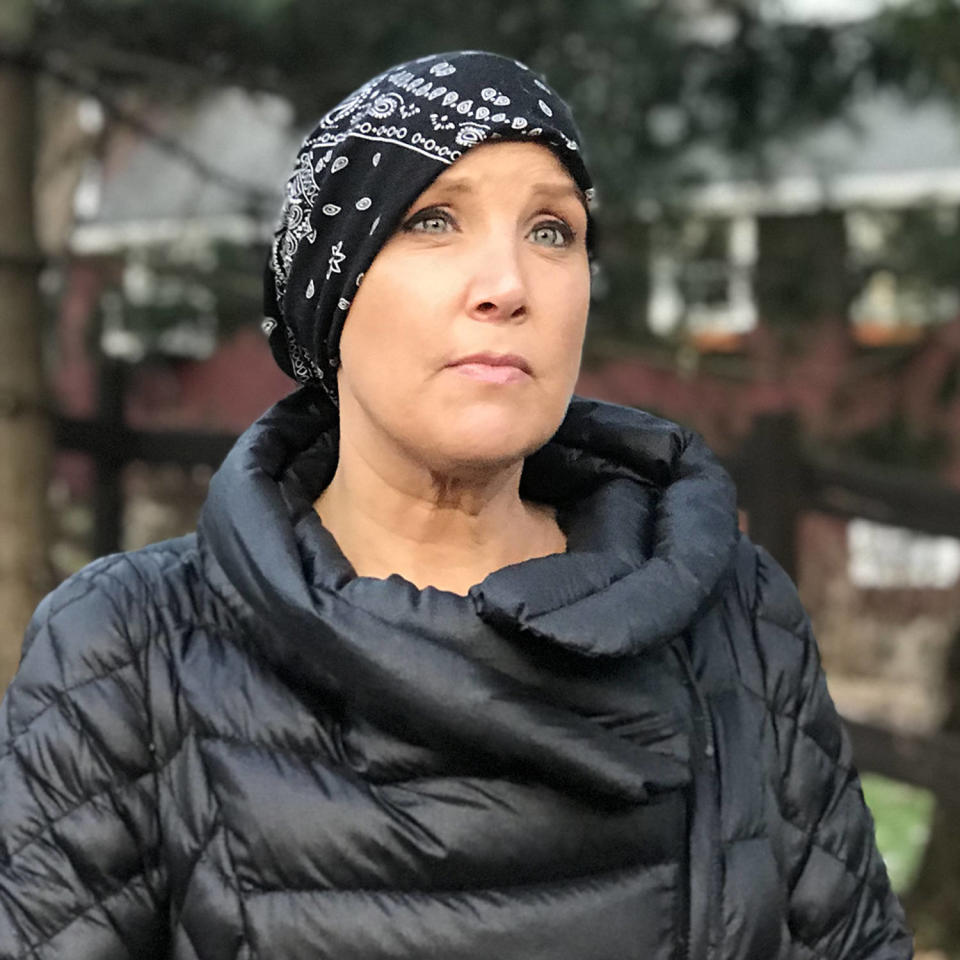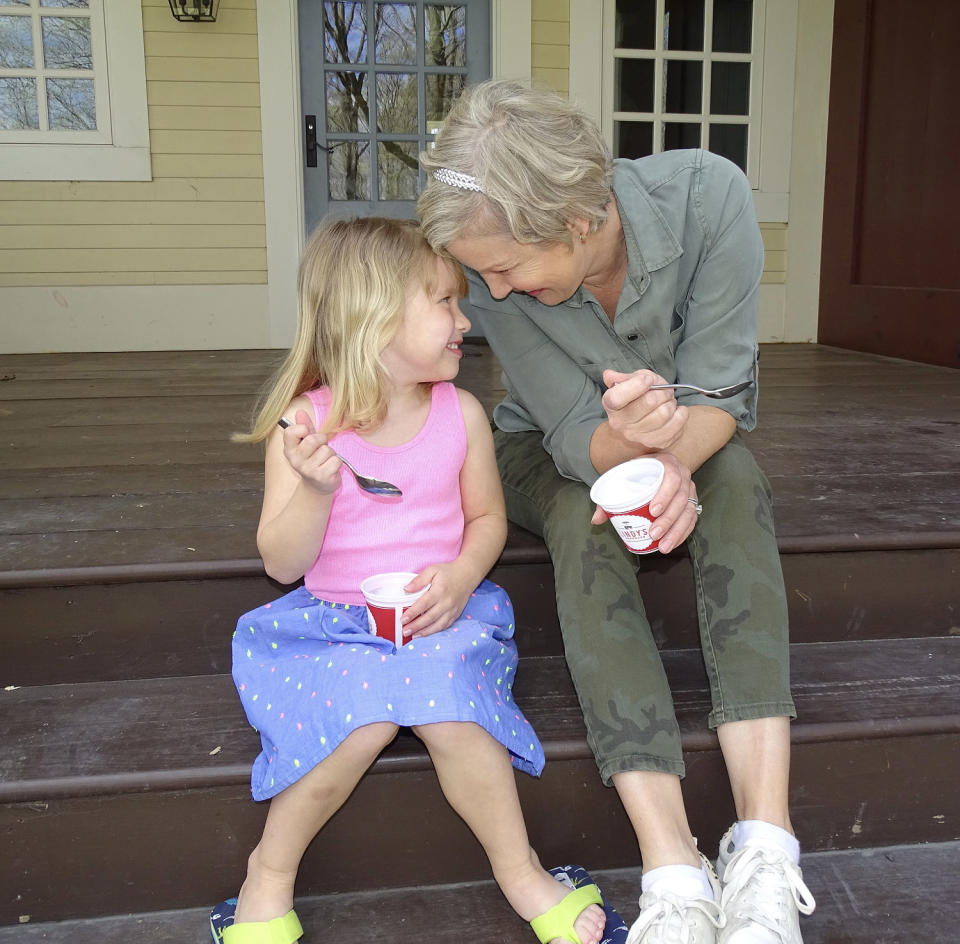Kristen Dahlgren: Why I’m leaving NBC to launch a nonprofit to make breast cancer vaccines a reality
I first walked into 30 Rockefeller Center as a Nightly News intern in 1993. I dreamed of being a network correspondent, traveling the world and changing it by shedding light on those in need. Through my reporting, I hope that in my own small way I have made a difference for someone out there. This has been my dream job and there are only a few things that would make me change course: If it was best for my family, best for my health, or if I thought I had the chance to change the world on a much bigger scale.
This morning, those three things are coming together. Don’t worry, I’m healthy. My cancer is still in remission, but as a breast cancer survivor fears of a recurrence are always there. Which is why when I met Dr. Nora Disis last fall, I was filled with hope. Disis is a researcher at UW Medicine’s Cancer Vaccine Institute, and she is one of a handful of doctors getting closer to breast cancer vaccines.
“Can you imagine a world where no one would die of breast cancer because of a vaccine?” Disis recently asked me. This question didn’t surprise me — and it’s not a pipe dream. I’ve spent the last four months researching and reaching out to the top cancer researchers and oncologists in the country.
In 2013, Disis and her team made headlines with a promising trial involving 66 women with advanced-stage HER2-positive breast cancer. While this trial was not designed to assess whether the vaccine could slow or prevent the progression of breast cancer, the researchers noted that many of their participants have survived longer than would be expected normally. About half of people with this type of cancer at these stages would be expected to die within five years of the treatment. Of those who received the optimum vaccine dose, 80% were still alive at the 10-year mark.
This month, I traveled to Seattle to see the Cancer Vaccine Institute’s lab and meet Disis and one of the trial participants, Brigette Hempstead. In 2013, Hempstead’s breast cancer had spread to her lungs and liver. Her oncologist told her she wouldn’t live more than a year. Instead of going home to die, she sought out the vaccine trial. Now, Hempstead says she has had some periods with no evidence of the disease, and when her scans do show signs of cancer, “they’re going away. They’re disappearing.” Hempstead explains that “the way that this vaccine works is …if the cancer comes up, then (the vaccine) shows up and really tries to help fight it.”
According to Disis, the knowledge of how to produce that immune response — and which parts of breast cancer can be targeted to kill tumors — are reasons she believes we’re at a tipping point in developing vaccines to eliminate breast cancer. Disis and her team are now working on STEMVAC, a vaccine candidate created to target cancer stem cells that aren’t reached by chemotherapy or radiation. Researchers hope it could be used for different types of breast cancer. It’s already in phase 2 trials.
Cancer Vaccine Institute is not the only place doing this groundbreaking work. The Cleveland Clinic and Anixa Biosciences recently announced positive data from a phase 1 trial of a vaccine for aggressive triple-negative breast cancer, which is known as a harder cancer to treat. The majority of patients developed the intended T-cell responses with no negative side effects.
Jenni Davis was the first person in the world to receive Cleveland Clinic’s vaccine. As a nurse, she knew the reality of a triple-negative diagnosis. “I wanted to see my kids grow into adults and… get married and have kids and I was just, I was very scared and worried that … those things weren’t going to happen for me,“ she recently told me.
She was thrilled when she qualified for Cleveland Clinic’s vaccine trial in 2019. She got the doses, and says her only side effects were lumps at the injection site. Doctors report that she had a positive immune response. She echoes what Brigette Hempstead and the doctors also told me. “The vaccine has taught my body to identify those cells and destroy them before they can become a tumor,” Davis says.
That’s the science, but there is also an almost unmeasurable emotional impact for Davis. “It’s given me hope for myself and my family,“ she says, adding that “the bigger picture is what this could mean for breast cancer …it could change everything. “

It’s a sentiment that was out of reach just a short time ago, but Disis says that’s what they are now striving for — to have vaccines for all breast cancer patients and those who are at high risk. “What we really need is to be able to evaluate these vaccines in a very uniform manner with a lot of eyes looking at the data coming out of these trials,” Disis explains. “We are all working in our individual silos … but if we collaborated, we could get this done in five to ten years instead of 30.”
Dr. Tom Budd, a physician at the Cleveland Clinic, agrees and is hopeful. “I am definitely encouraged, there are immune responses being produced.“ But Budd cautions that “to really show this in a highly reproducible way, though, we need large studies. And that’s why we need collaboration so we can do the big studies that will prove what works.”
It all made such sense to me. Why wouldn’t we help the top researchers to come together and prove their concepts as quickly as possible? It could save hundreds of thousands of lives. So, when another breast cancer survivor I interviewed in 2022 came to me with an idea to do just that, I was all in.
Michele Young is an Ohio lawyer and stage 4 breast cancer survivor who was also once told to go home and start chipping away at her bucket list. Today, she is in complete remission and is committed to helping all people have access to effective and timely screenings for breast cancer. She helped Ohio pass legislation guaranteeing additional screening for dense breasts, and ensuring it would be covered by insurance.
Now, she is turning her attention to vaccines, and together, we have formed a nonprofit called the Pink Eraser Project, an effort to bring the nation’s top minds together to accelerate breast cancer vaccines.
The Pink Eraser Project will connect researchers at major centers across the U.S., including experts from Memorial Sloan-Kettering, MD Anderson Cancer Center, the Cleveland Clinic, UW Medicine’s Cancer Vaccine Institute and Roswell Park Comprehensive Cancer Center. Our goal is to build a pool of breast cancer survivors to help spread the word about joining trials, work with other institutions doing breast cancer vaccine research, and to partner with the hundreds of amazing support organizations that have been lifting up breast cancer patients and supporting research for years.
If I have learned anything in my decades as a journalist it is that one person really can change the world. Of course, it is much more effective if it becomes a movement with everyone behind it. According to the National Breast Cancer Foundation, 1 in eight American women will be diagnosed with breast cancer in her lifetime. An estimated 43,000 will die from it this year. Why wouldn’t we try to stop it?
As a survivor I know first-hand that current treatments are difficult and have a lasting impact on your body. I will likely never feel my little girl cuddling into my chest. Lifting my right arm is often restricted and painful. Radiation has left me with lung fibrosis, and the scars cut across my chest and abdomen are constant reminders.

Today, however, I know we are closer to a day when those who have the disease — or those at high risk of developing it — could choose a vaccine that instructs their own body to kill the cancer. I believe we’re on the cusp of having technology to make that safe, effective and affordable for everyone who wants it.
In many places in the world, there are no diagnosis or treatment options available, even after a tumor is big enough to feel. Vaccines could be the way to give everyone a chance at survival. That is what the Pink Eraser Project is all about. It's a chance to erase breast cancer as a fatal disease and, someday, this could lead to vaccines for other cancers as well. We’re laser-focused on breast cancer to streamline the process, but we know the ripple effects will help millions.
I always marveled at the people I interviewed who said they were grateful for their life-altering events, even the tragic ones, because it led them to a unique perspective and ability to impact others. I understand that now. So, while I will deeply miss my colleagues at NBC News who have been my work family for decades, it is time for me to leave and refocus my energy into the Pink Eraser Project. I know I am exactly where I need to be to effect change for all of us.
Thank you for watching and supporting me over the years. I am so grateful for every second of my three decades bringing you the news. Please know that I am walking out the door just as I came into it in 1993 — full of absolute wonder and bursting with hope for the future.
This article was originally published on TODAY.com

